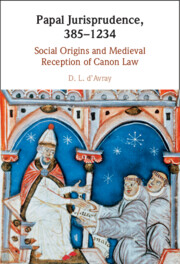‘The history of the papacy in the early Middle Ages is plagued with conflicting scholarly interpretations of its role, importance, and doctrines. David d’Avray has written a masterfully lucid analysis of the first papal letters, papal authority and institutions, and the problems the bishops of Rome faced as they strove to create a universal set of norms for the church.’
Kenneth Pennington - Catholic University of America
‘As he did for sermons, David d’Avray combines meticulous case studies and a compelling narrative to explain the responsive nature of canon law and collapse distinctions between Late Antiquity and the Middle Ages. Both late antique and high medieval papal decretals were issued and interpreted in response to ‘social complexities and uncertainties.’ The sheer quantity and complexity of papal decretals in canon law collections and the specialist glosses these required meant that canon law became dominated by Rome rather than local experts, forever determining the nature of canon law in the West.’
Jessalynn Bird - Saint Mary's College, Notre Dame, IN
‘If you think you know what a book about papal decretals is going to be like, think again. This is not a standard accounting of popes and recipients, textual reception, and early medieval or later canonical collections … It is difficult to express how interesting a book d’Avray has written. He brings new insights and frameworks to the topic of papal decretals, pushes historians to think well beyond their typical chronological limits, and convincingly demonstrates that careful and even tedious textual and manuscript research can profitably be combined with larger social analyses …’
Atria A. Larson
Source: The Medieval Review
’d’Avray’s thesis of the two decretal ages is convincing, and highly stimulating for the interpretation and evaluation of papal letters. By confronting the two phases, furthermore, the author calls into question familiar period boundaries, which assign the two decretal ages to different fields of research. How fruitful it can be to cross period boundaries, as in this case, is demonstrated by the book.’
Cornelia Scherer
Source: H-Soz-Kult
'… an extremely stimulating book, which brings out in a granular and penetrating way the significance of papal decretals for the evolution of law in general, and also sets them in their historical context with the help of sociological models...'
Lotte Kéry
Source: Historische Zeitschrift
‘… an admirable achievement from which the study of history will benefit for a long time. In a nutshell … a great, a great work!’
Eva Grassi
Source: Quellen und Forschungen aus italienischen Archiven und Bibliotheken
‘This is a thought-provoking book, written in a very readable, indeed conversational, style that allows the reader to share the author’s enthusiasm.’
Julia Barrow
Source: American Historical Review
‘[A] fine work … [This review] cannot do complete justice to the richness of this work, its erudition, its original and stimulating perspective.’
Michèle Bégou-Davia
Source: La revue historique de droit français et étranger



